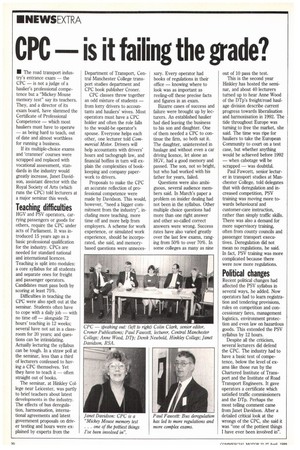CPC is it failing the grade?
Page 30

If you've noticed an error in this article please click here to report it so we can fix it.
11 The road transport industry's entrance exam — the CPC — is not a judge of a haulier's professional competence but a "Mickey Mouse memory test" say its teachers. They, and a director of its exam board, have slammed the Certificate of Professional Competence — which most hauliers must have to operate — as being hard to teach, out of date and almost worthless for running a business.
If its multiple-choice exams and 'crammer' courses were scrapped and replaced with vocational assessment, standards in the industry would greatly increase, Janet Davidson, assistant director with the Royal Society of Arts (which runs the CPC) told lecturers at a major seminar this week.
Teaching difficulties
HGV and PSV operators, carrying passengers or goods for others, require the CPC under acts of Parliament. It was introduced 15 years ago as a basic professional qualification for the industry. CPCs are needed for standard national and international licences. Teaching is split into modules: a core syllabus for all students and separate ones for freight and passenger operators. Candidates must pass both by scoring at least 75%.
Difficulties in teaching the CPC were also spelt out at the seminar. Students often have to cope with a daily job — with no time off — alongside 72 hours' teaching in 12 weeks; several have not sat in a classroom for 20 years; and questions can be intimidating. Actually lecturing the syllabus can be tough. In a straw poll at the seminar, less than a third of lecturers confessed to having a CPC themselves. Yet they have to teach it — often straight out of books.
The seminar, at Hinldey College near Leicester, was partly to brief teachers about latest developments in the industry. The effects of bus deregulation, harmonisation, international agreements and latest government proposals on driver testing and hours were explained by experts from the Department of Transport, Central Manchester College transport studies department and CPC book publisher Croner.
CPC classes throw together an odd mixture of students — from lorry drivers to accountants and hauliers' wives. Most operators must have a CPC holder and often the role falls to the would-be operator's spouse. Everyone helps each other, one lecturer told Commercial Motor. Drivers will help accountants with drivers' hours and tachograph law, and financial boffins in turn will explain the complexities of bookkeeping and company paperwork to drivers.
Proposals to make the CPC an accurate reflection of professional competence were made by Davidson. This would, however, "need a bigger commitment from the industry", including more teaching, more time off and more help from employers. A scheme for work experience, or simulated work experience, should be incorporated, she said, and memorybased questions were unneces sary. Every operator had books of regulations in their office — knowing where to look was as important as reeling-off these precise facts and figures in an exam.
Bizarre cases of success and failure were brought up by lecturers. An established haulier had died leaving the business to his son and daughter. One of them needed a CPC to continue the firm, so both sat it. The daughter, uninterested in haulage and without even a car driving licence, let alone an HGV, had a good memory and passed. The son, not so bright, but who had worked with his father for years, failed.
Questions were also ambiguous, several audience members said. In March's paper a problem on insider dealing had not been in the syllabus. Other multiple choice questions had more than one right answer and other so-called correct answers were wrong. Success rates have also varied greatly over the last few exams, ranging from 50% to over 70%. In some colleges as many as nine out of 10 pass the test.
This is the second year Hinkley has hosted the seminar, and about 40 lecturers turned up to hear Anne Wood of the DTp's freight/road haulage division describe current progress towards liberalisation and harmonisation in 1992. The tide throughout Europe was turning to free the market, she said. The time was ripe for hauliers to take the European Community to court on a test case, but whether anything would be achieved before 1992 — when cabotage will be scrapped — was doubtful.
Paul Fawcett, senior lecturer in transport studies at Manchester College, told delegates that with deregulation and increased competition, PSV training was moving more towards behavioural and customer-care instruction, rather than simply traffic skills. There was also a demand for more supervisory training, often from county councils and passenger transport executives. Deregulation did not mean no regulations, he said. In fact, PSV training was more complicated because there were now more regulations.
Political changes
Recent political changes had affected the PSV syllabus in several ways, he added. Now operators had to learn registration and tendering provisions, rules on competition and concessionary fares, management logistics, environment protection and even law on hazardous goods. This extended the PSV syllabus by 12 hours.
Despite all the criticism, several lecturers did defend the CPC. The industry had to have a basic test of competence, below the level of exams like those run by the Chartered Institute of Transport and the Institute of Road Transport Engineers. It gave operators a certificate which satisfied traffic commissioners and the DTp. Perhaps the most telling comment came from Janet Davidson. After a detailed critical look at the wrongs of the CPC, she said it was "one of the pottiest things I have ever been involved in".
















































































































